With violent crises surging around the world, Korea should incorporate humanitarian aid into its national policies and social debate, eliciting wide-ranging political, financial and public support, according to the head of the International Committee of the Red Cross mission here.
In an interview with The Korea Herald, Georgios Georgantas, who took the helm of the global humanitarian institution’s Korea office in May, stressed that the number, scale and duration of conflicts worldwide have expanded significantly in recent years, putting additional strain on humanitarian agencies.
“The right path to take is to adopt a global perspective on these issues and take into account the humanitarian aspect in political, economic, social and legal discourses,” he said at the office in Seoul. “As much as working in operational contexts in conflict areas is important, drawing the support of various countries is crucial to the success of our work on the ground.”
The ICRC is the world’s oldest humanitarian organization, established in 1863 in Geneva, Switzerland. It has operations in over 80 countries around the globe, including North Korea. The Seoul office, which opened in March 2015, develops dialogues with Korean diplomats, politicians, scholars, researchers, police, military officers and soldiers for political, financial and manpower assistance. It also raises public awareness of its activities and conflicts worldwide, alongside educating professionals on humanitarian law.
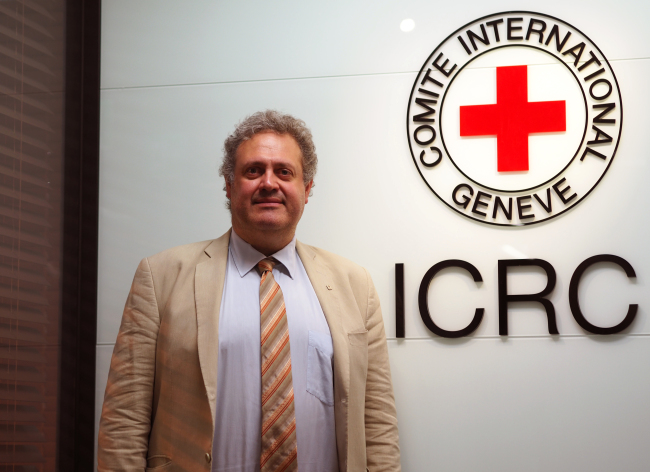 |
Head of the International Committee of the Red Cross mission in Korea Georgios Georgantas (Joel Lee/The Korea Herald) |
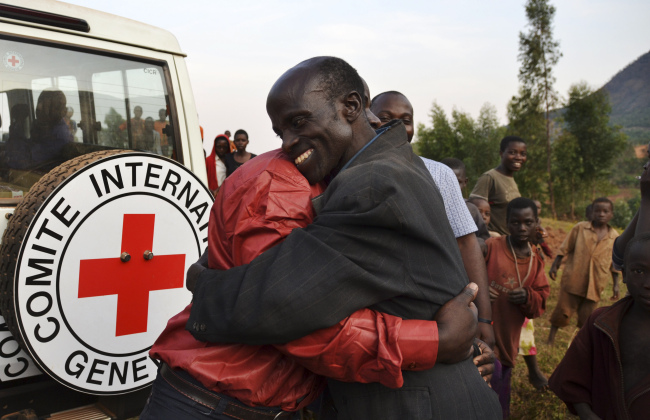 |
A separated family rejoices being reunited through the work of ICRC in the Makamba Province, Burundi. (The International Committee of the Red Cross) |
A native of Greece, Georgantas joined the ICRC in 1999 and has undertaken missions in conflict-stricken countries like Bosnia, Burundi, the Central Africa Republic, Palestinian Territories, Angola and India.
According to the ICRC, some of most severe needs are in Syria, South Sudan, Yemen and countries around Lake Chad in Africa -- Nigeria, the Republic of Niger and Cameroon, which have been devastated by the Boko Haram guerilla group. There are numerous other underfunded projects in Afghanistan, Israel and the Palestinian Territories, the Democratic Republic of the Congo, South Sudan, Mali, Myanmar, Mexico, Ukraine and Colombia, among others, according to the Seoul mission.
“The situations in most countries require developing a whole palette of approaches, encompassing solutions for the missing, separated families, people with lost contacts and detained persons,” Georgantas explained. “We provide not only food and emergency aid, but also support various microeconomic activities like giving small amounts of money, expertise and seeds to cultivate the land.”
Other types of support include water and sanitation -- ranging from constructing water pipes in towns to offering water at displacement camps -- as well as first aid to the wounded, psychological treatment for the traumatized and physical rehabilitation classes and artificial limbs.
Referring to migrants from the Middle East and northern Africa who risk their lives to cross the Mediterranean Sea and reach Europe, Georgantas said they “absolutely needed to get away from their motherlands,” as they could face death or no hope for a future at home.
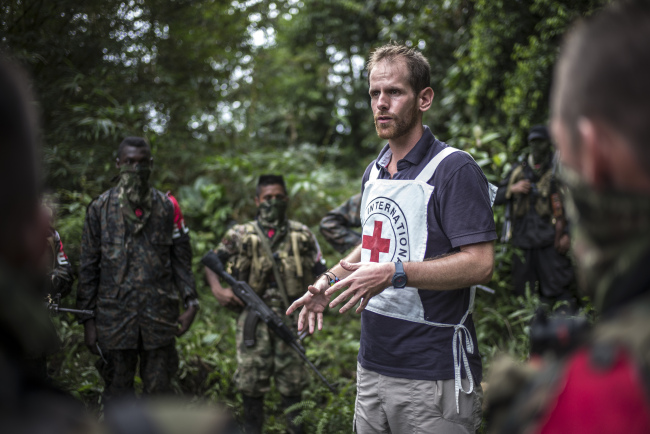 |
An ICRC operator speaks to members of the ELN armed guerilla group about the principles of international humanitarian law and obligations to protect civilian lives in a jungle in Colombia (The International Committee of the Red Cross) |
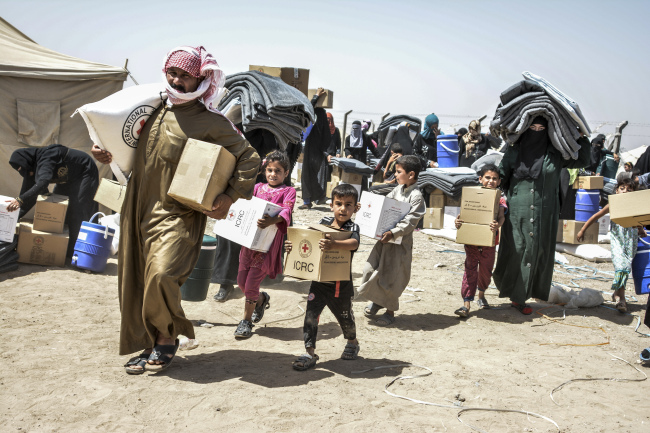 |
A displaced family at an IDP camp in Fallujah, Iraq receive food and relief items from ICRC. (The International Committee of the Red Cross) |
“The lesson we should all take is that not one country can deal with these problems. It’s an international problem and demands an international response,” he highlighted.
Many of these conflicts have become protracted over numerous years, he noted, adding that providing humanitarian aid has increasingly taken into account the sustainable management of livelihood -- adopting “smart, context-specific” solutions aimed at strengthening the economic resiliency of people, often in cooperation with local authorities.
“What’s important is that we are able to remain in these distraught regions and develop programs that have sustainable impacts on the lives and dignity of people,” according to Georgantas.
The ICRC has also operated in North Korea since 2002, providing health care, water and sanitation at hospitals and physical rehabilitation centers in Pyongyang. Its orthopedic centers produce artificial limbs for people with amputations. The Pyongyang office constantly evaluates its needs and decides on the volume of support in discussion with North Korean authorities, he noted.
Lauding Scandinavian countries for their world-leading contributions to global humanitarian initiatives -- encompassing financial aid through official development assistance as well as the ratification of international treaties -- Georgantas said, “It took time. It didn’t happen overnight for them to be where they are.”
“My feeling is that Korea is starting to go in the right direction, although it will take time. The political will is there,” he added.
By Joel Lee (
joel@heraldcorp.com)
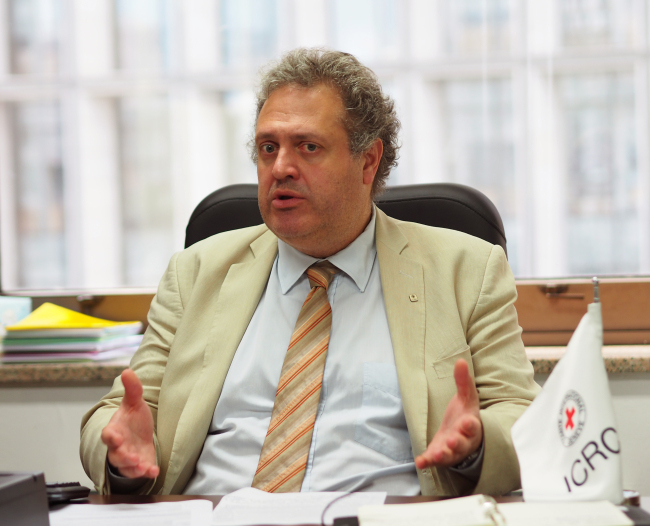 |
Head of the International Committee of the Red Cross mission in Korea Georgios Georgantas (Joel Lee/The Korea Herald) |
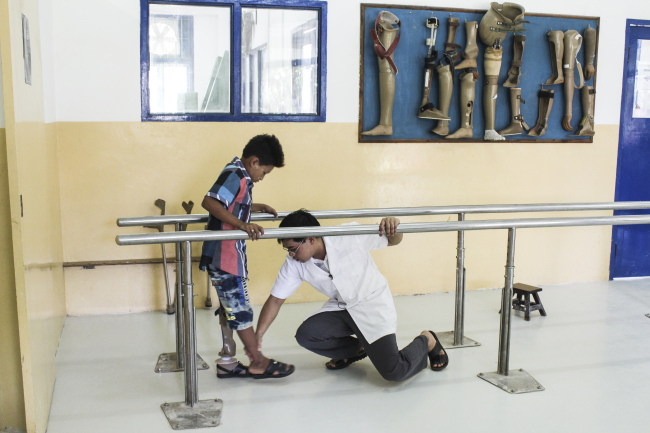 |
An amputated child receives assistance from an ortho-prosthetist working for the ICRC with a newly fitted prosthetic leg in southern Myanmar. (The International Committee of the Red Cross) |










![[Exclusive] Hyundai Mobis eyes closer ties with BYD](http://res.heraldm.com/phpwas/restmb_idxmake.php?idx=644&simg=/content/image/2024/11/25/20241125050044_0.jpg)
![[Herald Review] 'Gangnam B-Side' combines social realism with masterful suspense, performance](http://res.heraldm.com/phpwas/restmb_idxmake.php?idx=644&simg=/content/image/2024/11/25/20241125050072_0.jpg)

